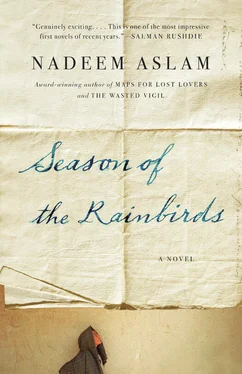It had happened so quickly. The vehemence shocked them both.
His wife’s voice had risen in pitch: ‘Some of us don’t have time to think. We’re too busy trying to get through the day with our hides intact. We don’t have time to analyse . If you don’t agree with what I said then you tell me, Yusuf Rao- sahib , what you plan to do when the police inspector comes back with his men tonight. I’m sure you’d be happy to live in gaol for the next six months, eating government-paid chappatis, but I have to think about how I’m going to feed these children of yours.’
She stared at him challengingly.
Their raised voices had attracted the children from the adjoining room. They stood holding the jar full of suffocated fireflies.
‘All right, all right.’ Yusuf Rao raised his hands. ‘But you’ll have to think of something, because even if they don’t manage to take me away, I won’t be able to go to work for the next few months. The office is right in front of the barracks and the courthouse. They’ve probably already put their own padlock on the door.’

Having spent the preceding eight or so hours in the mosque, Maulana Hafeez returned to his house at noon.
His wife dropped the newspaper and stood up at once to indicate that the distraction had been momentary — her true concern all morning had been Maulana Hafeez.
In response to a question about the chill on his lungs Maulana Hafeez shook his head: his health did not require immediate attention. And yet his cheeks were sunken and colourless, the skin waxen; his breathing raspy. He seated himself beside the woman and picked up the newspaper. ‘What’s in here?’
‘You didn’t come back for breakfast, Maulana-ji. And you haven’t slept.’
‘I was praying.’
She leaned towards him, frowning, speaking quietly. ‘What happened last night wasn’t your fault, Maulana-ji. You mustn’t hold yourself responsible. If you hadn’t given that sermon then Maulana Dawood would have done so. And soon.’
‘I knew that,’ Maulana Hafeez said. ‘That’s why I acted as I did.’
The woman watched the lustreless eyes. There was an odd serenity in the way he spoke — reassurance? delusion?
With the back of his fingers the cleric struck an area near the centre of the newspaper. ‘ This kind of thing mustn’t be allowed to spread.’ He was referring to the phenomenon of mosques being ‘conquered’ by armed mobs of rival sects. ‘Tonight, after Isha, I will visit Maulana Dawood at his mosque.’
The woman nodded, doubtfully. ‘They might be hostile, Maulana-ji.’ And she pointed at the newspaper, to the item giving news of the latest raided mosque in Lahore.
Maulana Hafeez shook his head. ‘But now I have to visit Elizabeth Massih, to see how she is.’
‘Is that wise, Maulana-ji?’
Maulana Hafeez inclined his head in a nod, lowering his chin into his collar.
‘You shouldn’t go there alone, Maulana-ji. Perhaps … perhaps I should come with you.’
The cleric considered, stroking his beard, and finally murmured in assent.
While his wife went to collect her cloak Maulana Hafeez gazed vacantly at the newspaper.
Her cloak, the burka — a long cape of white satin draped from a skullcap, with holes at face level — fell in great folds towards the ankles. As she adjusted it, searching for the perforated section, the white moths and butterflies embroidered on the cloth danced in circles around her.
‘Hasn’t there been any news of her?’ Maulana Hafeez asked standing up, when she came back gathering the folds to the front of the chest.
‘People have already forgotten about last night, Maulana-ji. The whole town is in turmoil. The deputy commissioner has telephoned back a list of people to be arrested. They say there was an attempt on the General’s life two days ago. They’ve been arresting people since dawn. They shot one man in the shoulder as he tried to escape through his back window. In some cases they’ve taken children away to force fathers out of hiding.’
‘Someone tried to kill the General? ’ Maulana Hafeez asked, incredulous.
‘Two days ago,’ the woman answered through the holes arranged in a honeycomb pattern before her face. ‘The curfew in the big cities which I told you about last night is due to that.’
Maulana Hafeez asked, ‘And over the telephone, did the inspector tell the deputy commissioner anything about last night?’
A gentle breeze blew from the west. There was a smell in the air, of sweet pulp rotting.
‘I don’t know, Maulana-ji.’

The waters were at their yearly highest, the rivers tightening their grip on the town. The narrow lanes of the lower side would soon be under water. The couple would have great difficulty in reaching the Christian neighbourhood.
Maulana Hafeez’s wife, walking three paces behind him, asked, ‘How do you greet a Christian, Maulana-ji? Can we say salam-a-lekum , or is that used just with Muslims?’
Now fully swaddled in cloud, the sun had offered a reluctant profile about an hour ago. Kites and buzzards were wheeling and soaring in the sky.
Maulana Hafeez half turned towards his wife. Nearby a hen papiha peeped. The cleric summoned his remaining strength and tried to think.
The End

Aambi Unripe mango
Ahmadiya The Ahmadiya movement was founded in 1889 in Northern India by Mirza Gulam Ahmed who proclaimed that he was the Promised Reformer whose advent was awaited by the adherents of Islam. This claim is contested throughout the Islamic world and the Ahmadiyas are denounced as blasphemers. There are, nevertheless, ten million Ahmadiya Muslims living in 120 countries around the world
Apa Form of address of older female
Asar Third prayer of the day
Baba Form of address for old man
Banéra Short wall or filigreed fence used to mark boundaries on flat roof
Bérry Large thorny tree bearing edible berry-like fruit; of jejube family
Bésan Gram flour
Bhoot Ghoul
Bote Fledgling
Burka Cloak
Chacha-zad Cousin
Chappati A flat bread
Chaval Rice
Chodhi Untouchable
Daig Cauldron
Dhi Daughter
Dhrake Tree of Margosa family
Djinn Spirit of supernatural power able to appear in human and animal forms
Eid Festival celebrating the end of the month of Ramadan
Fakir Ascetic/mendicant
Falsé Kind of berry
Ghat Approach to a river
Goonda Henchman
Gora White man
Gul-é-lala Tulip-like tropical plant ( gul , flower; lala , red)
Harami Bastard
Hira mundi The district of prostitutes
Isha Last prayer of the day
Ishq-é-péchan Straggly trailing plant bearing pink and red flowers in bunches ( ishq , a love affair; péchan , complex)
Jand Large tree with white flowers
Janvar Animal
Jinaza-gah Place assigned for funeral prayers
Kulcha Unleavened flat bread
Kurio Girls (sing, kuri )
Langra mango Superior variety of mango
Magrib Fourth prayer of the day
Читать дальше














